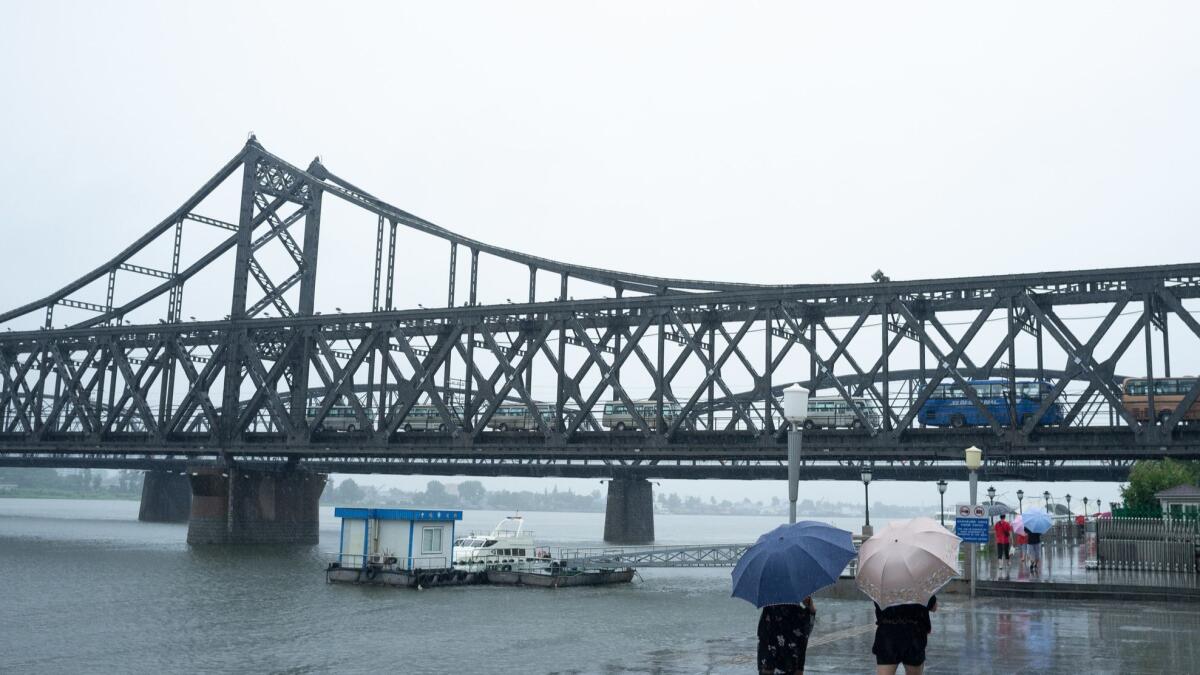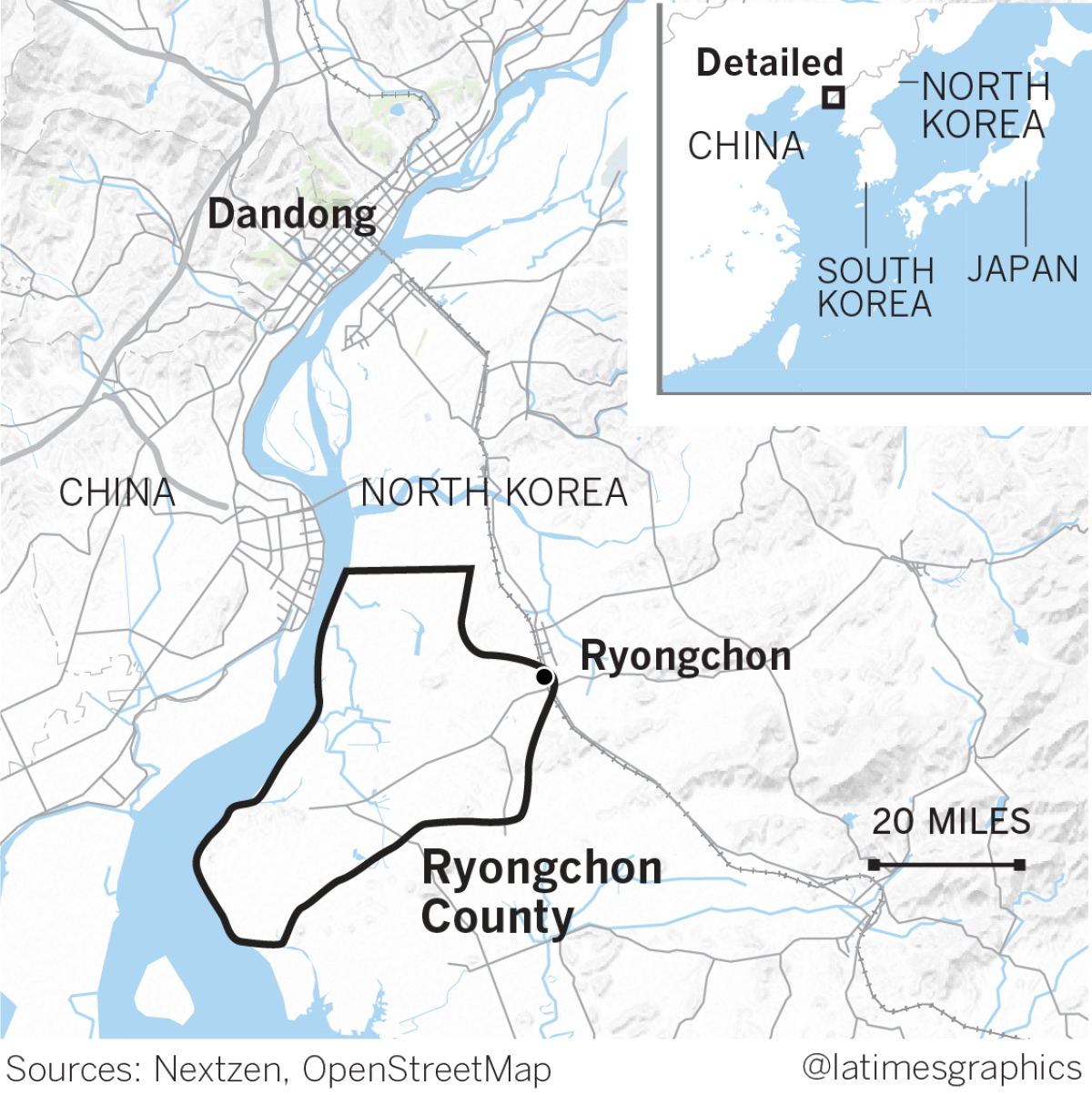China is quietly relaxing its sanctions against North Korea, complicating matters for Trump

- Share via
Reporting from Dandong, China — It was drizzling rain, and gloomy clouds darkened the surface of the Yalu River separating this Chinese city from its North Korean neighbor.
In a nearby commercial district named after an old Korean kingdom, a group of men distinguishable only by their high cropped haircuts and the pins in their lapels depicting Kim Jong Un’s father and grandfather were acting out a tiny drama with broader implications for President Trump’s foreign policy and the future security of the United States.
The men, and a handful of women accompanying them, slipped in and out of storefronts to buy cosmetics and other personal items to take back home. More important, they paid inconspicuous visits to the offices of trading firms that account for part of the vital flow of goods between China and North Korea.
The presence of these visitors was a small but telling sign that China’s critical role in the punishing international embargo on trade with Pyongyang — an embargo the Trump administration is counting on to force North Korea to stop building nuclear weapons — seems to be breaking down.
After his dramatic summit meeting with North Korean leader Kim Jong Un in June, Trump declared on Twitter, “There is no longer a Nuclear Threat from North Korea.”
Administration officials were quick to say the actual elimination of that threat would be the subject of negotiations now underway.
And, they said, the trade embargo that China has played a pivotal role in enforcing would ease only after North Korea had taken significant steps to stop developing nuclear weapons and long-range missiles.
The visits by North Korean trade officials in Dandong, along with a boomlet in Chinese tourists to Pyongyang and elsewhere in North Korea, are far from the only signs that Beijing is not waiting.
Instead, it has quietly begun loosening the screws on its long-time ally.
U.S. satellite images and Japanese naval photos have captured suspected illicit ship-to-ship transfers of oil. And experts say North Korean workers are returning to jobs inside China, some under the guise of educational exchanges. Thousands of North Korean laborers also have entered Russia since the U.N. ban against new work permits last September, the Wall Street Journal has reported.
Those workers send home hard-cash wages that, combined with large slush funds likely from prior years of coal sales and clandestine trading networks built up across China and southeast Asia, allow Pyongyang to pursue its nuclear ambitions while keeping its political elite happy with fine liquor, designer watches and the latest electronics normally unobtainable at home.
Some of these transactions, like procuring luxury goods, are clear violations of United Nations resolutions aimed at choking back Pyongyang’s nuclear programs.
Other activities fall into grayer areas. For instance, there were reports that Beijing recently decided to spend about $88 million for road construction around a new but as-yet-unused bridge linking the key trading center of Dandong with North Korea’s Ryongchon County.

Clear-cut or ambiguous, however, all these activities present a vexing problem for the United States as the Trump administration looks to Kim to follow through on his vaguely-worded summit pledge to denuclearize.
Tightening of international sanctions, powerfully boosted by tougher enforcement by China, North Korea’s indispensable economic patron, was thought to have played a major role in bringing Kim to the bargaining table with Trump.
Trump hailed the historic June 12 summit in Singapore as a major success.
Since then, U.S. talks with North Korea and progress toward the “complete denuclearization” that Kim committed to have been slow.
Even as Kim seemingly made good on his pledge to return the remains of U.S. soldiers killed during the Korean War from 1950 to 1953, evidence has grown that North Korea is proceeding with its nuclear and missile programs. Recent indications include construction activity at a missile facility in Sanum-dong in the Pyongyang area and a nuclear-enrichment site at Yongbyon.
At the same time, North Korea has stuck by its word to stop conducting nuclear and missile tests.
Trump has made much of the cessation of tests, but in the eyes of analysts, Beijing believes it now has a kind of green light to rebuild its relations with Pyongyang, easing enforcement of sanctions and resuming business activities that help the North Korean regime hold onto power.
Moreover, Washington’s escalating trade war with China has opened up options for North Korea.
In the absence of U.S.-China coordination, Kim has “two separate lines of negotiations, one with Beijing and one with Washington, [which] makes the denuclearization much more difficult in terms of getting the type and pace of movement that Washington wants,” said John Park, a North Korea specialist at Harvard’s Kennedy School of Government.
“The bar is very low,” he said. “In practice, what we’re seeing is that North Korea just has to abide by a moratorium on nuclear and ballistic missile testing, and you would essentially see the ability to move forward on an easing of implementation of sanctions from China.”
Secretary of State MIchael R. Pompeo has accused North Korea of violating various sanctions imposed by the U.N., and last month sought to have the U.N. Security Council ban oil transfers to North Korea. The effort was blocked by China and Russia.
“When sanctions are not enforced the prospects for the successful denuclearization of North Korea are diminished,” he said.
Trump tweeted earlier last month that China might be undercutting U.S. efforts at denuclearizing North Korea, but China’s foreign ministry has insisted that Beijing is acting responsibly.
Chinese analysts say Beijing remains legally bound to the U.N. restrictions. “The improvement in trade is limited,” said Yi Baozhong, a Northeast Asia expert at Jilin University in Liaoning province, which borders North Korea and where many ethnic Koreans live.
Tong Zhao, a fellow at the Carnegie-Tsinghua Center’s nuclear policy program in Beijing, notes that China’s previous imposition of economic sanctions on North Korea may have gone beyond the international requirements.
“As long as North Korea continues to make progress on the issue of nuclear abandonment, China should hope to help North Korea carry out economic development and national transformation,” he said. “North Korea hopes to continue to win over China using the strategic competition between China and the United States, and to obtain the greatest economic benefits from China.”
In 2009, China and North Korea, then led by Kim’s father, Kim Jong Il, agreed to work together on economic development, tourism and education.
But party-to-party relations were strained thanks to Kim Jong Un’s nuclear tests and capricious acts of violence. Beijing pulled back on trade and other programs that had propped up the isolated North Korean economy.
The North’s exports to China, once dominated by coal, skidded in the second half of last year to practically nothing, and China’s official customs data show there’s been no rebound through June. But Chinese exports into North Korea have risen steadily in recent months, doubling from early in the year to about $200 million in June.
“We’re running up against a clock on how long we can maintain as much pressure as possible,” said Troy Stangarone, senior director at the Korea Economic Institute, a nonprofit think tank.
Most of the China-North Korea trade has been seen as moving through Dandong, across the city’s Friendship Bridge. Reports from NK Pro, a publication specializing in North Korea, and other sources indicate that more truck crossings are taking place and that there’s been a relaxing of customs inspections.
“If authorities are increasingly lax in their monitoring of trade flows across the border, they may well be turning more of a blind eye to smuggling and other trade that goes under the radar as well,” said Benjamin Silberstein, an associate scholar at the Foreign Policy Research Institute, writing in NK Pro.
Here in Dandong, owners of trading firms and brokers say commercial activity with the North, while up some, remains low given the dramatic hit from the sanctions in prior months. But even if the floodgates are not entirely open now, the current developments are troubling signs for the future.
This is true even though most people in China still look down on North Korea as a backward, communist little brother. Not that that doesn’t hold fascination for many Chinese.
On the same gray July week that the North Korean officials were moving in and out of those trading offices, a group of Chinese tourists jammed onto a 30-foot boat that set out for a cruise along the Yalu River.
Suddenly, one of the tourists spotted a lone North Korean figure pedaling along the the opposite shore on a bicycle.
“Look,” the Chinese tourist shouted to his friends as he pointed to the cyclist: “Express Delivery.”
The crowd burst out laughing.
Follow me at @dleelatimes
More to Read
Inside the business of entertainment
The Wide Shot brings you news, analysis and insights on everything from streaming wars to production — and what it all means for the future.
You may occasionally receive promotional content from the Los Angeles Times.











